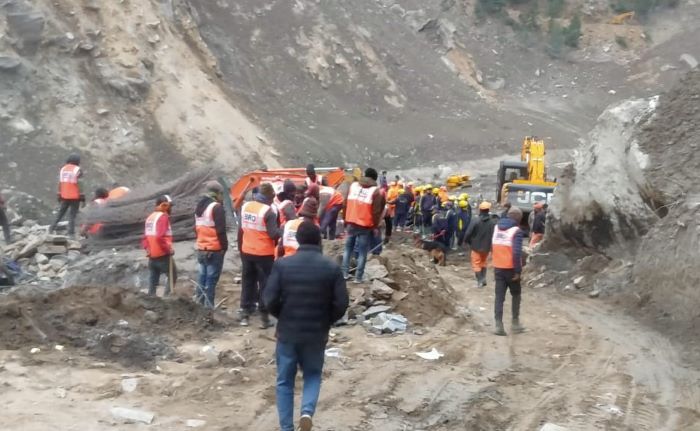A possible glacier collapse in the Chamoli district of Uttarakhand on February 7 led to a flash flood in the area because of the swelling of the Dhauli Ganga river. It caused massive destruction, killing at least 37 people (at the time of publishing, with 168 people still missing) and washing away the under-construction Tapovan-Vishnugad hydropower project. Initial reports have attributed the flooding to a glacial break, with some experts linking the event to climate change. The experts pointed to the increasing use of concrete cement structures instead of the traditional wood and stone masonry, which is creating a heat-island impact in the sensitive mountainous region.
An IISc analysis concluded that release of water from an underground glacial lake led to the flash flood. The team based its conclusion on images that suggest a 25 hectare depression in the bedrock near glacial ice in northern Nanda Devi, which is part of the Garhwal Himalayas in Chamoli district.
New satellite imagery, however, also points to the possibility that the flash flood was a result of fresh snow falling off the mountain, resulting in an avalanche that is estimated to have released 3-4 million cubic metres of water in the surrounding rivers. Latest images following the incident show a new lake forming due to accumulated debris in the river from Sunday’s incident, setting off fears of the possibility of a second surge in the river.
Sea levels likely to rise faster than IPCC estimate: Study
New research revealed the 1.1m sea level rise estimated by the recent Intergovernmental Panel on Climate Change (IPCC) through this century is “too low”. The actual rise is likely to be much faster, according to the study published in the journal OS Letters.
The IPCC predictions are based on models for ice sheets, glaciers and sea warming. But these models make their predictions based on the limited data available for testing. For example, there is scarce data on the melting of ice in the Antarctic before satellites observations that began in the 1990s. The recent study calculated the sea level rise caused by each degree of warming, also known as “transient sea level sensitivity”. Its findings were similar to some other studies that also concluded a faster sea level rise is already being seen and that previous studies have been conservative in their estimates.
Storm Eloise kills 21 in southern Africa
Storm Eloise, which made landfall in Mozambique, Southern Africa, at the end of January, killed 21 people, according to official data. The storm destroyed crops, homes and infrastructure and left tens of thousands of people displaced. This is the second tropical storm to hit the region in less than a month. Tropical storm Chalane had made landfall in December. The region also had barely recovered from the devastating Cyclone Idai, which had killed more than 1,000 people in 2019.
Wildfires rage in western Australia; 81 homes destroyed so far
Fires raging in western Australia have destroyed 81 homes so far, officials said. While the origins of the fires remain unknown, strong winds are hampering efforts to extinguish the blazes. This month marks a year since the devastating wildfires that killed 34 people and destroyed 18 million hectares of land in the country’s east coast. While scientists have linked the wildfires to climate change, experts are expressing increasing anger at the government’s failure to introduce any major climate measures.
48 US cities under-counting CO2 pollution by 20%: Study
Even as new US president Joe Biden works to prove his seriousness in tackling climate change, a new study revealed at least 48 of the country’s cities are under-counting their carbon dioxide pollution by nearly 20%. The study, published in the journal Nature Communications, arrived at this conclusion after comparing local disclosures with national-level data. About three-quarters of the country’s fossil fuel CO2 emissions comes from its cities. Under-counting of emissions will further complicate the US’ efforts to create targets in an attempt to cut down on its greenhouse gas emissions.
Noise pollution due to human activity impacting marine life: Scientists
Human noise is affecting the health of marine life, and has a similar impact to overfishing, pollution and the climate crisis, new research revealed. Sound is an important part of the marine ecosystem. This is because marine animals are better at hearing over long distances than they are at seeing or smelling. They use sound to catch prey, attract mates and defend their territory.
Noise pollution caused by human activities disrupts the natural ocean soundscape and increases the risk of death. The only saving grace, according to the researchers, is that unlike other adverse impacts, noise pollution can be stopped in an instant and therefore, is least likely to have long-term effects. The study recommended ships acquire quieter propellers, electric motors and slow down their speed in order to decrease the levels of noise pollution that they create.
About The Author
You may also like
With record breaking rain and heat, Uttarakhand reels under climate change impacts
Growing climate risks to India Inc call for a mindset shift, building resilience: Experts
Philippines island faces risk of heavy rainfall which is now 50% more intense, along with deadly landslides : WWA report
Seafood to lose nutritional value due to climate change: Study
14.5 million lives may be lost by 2050 due to climate change: WEF report


